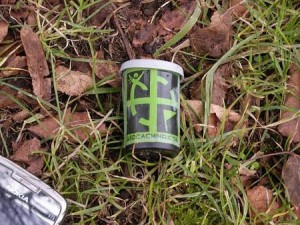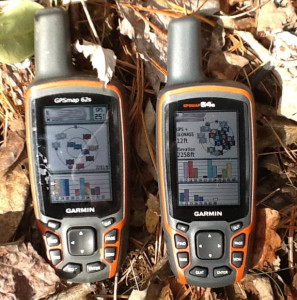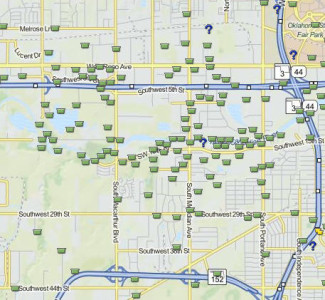 The world of geocaching is full of adventures and treasures to be found. But, for beginners who may not have a GPS device or have not used it outside of city directions, it can be a little daunting to get started. The only rules with geocaching are to sign the logbook, don’t let Muggles (people who don’t geocache) see you getting the cache, replace the cache exactly how you found it, and leave something if you take something. And have fun. It’s that simple!
The world of geocaching is full of adventures and treasures to be found. But, for beginners who may not have a GPS device or have not used it outside of city directions, it can be a little daunting to get started. The only rules with geocaching are to sign the logbook, don’t let Muggles (people who don’t geocache) see you getting the cache, replace the cache exactly how you found it, and leave something if you take something. And have fun. It’s that simple!
Here are a handful of things to consider once you decide to try your hand at treasure seeking.
Do Your Research
There are several different websites where you can log geocaches, each with their own pros and cons. The most common is geocaching.com, by far one of the largest geocaching sites. Sometimes the geocaches are a little questionable, but the sheer number of entries to choose from is extensive. Another slightly smaller site is TerraCaching, which claims to focus more on quality and nature with their caches than other bigger sites. Last, but not least, the Garmin-owned OpenCaching is still in beta, but has, understandably, a bit more compatibility with sending maps to your Garmin GPS. It also has a much smaller listing of caches.
If you’re just getting started, we recommend making an account on geocaching.com and working from there, depending on what you like.
Use the Right Device For You
 It probably goes without saying, but it’s important that you know how to use your GPS before you set out as you may have to manually input the latitude and longitude. At the very least, you’ll have to upload the right map before you leave. If you don’t have a GPS, there are a multitude of options for geocaching on your iPhone or Android to get you started. The reviews on these apps seem mixed, however, and depend on what phone you have, what service you have, and the app itself. Test out a few and see which works for you. Keep in mind that, whether you are using your phone or a handheld GPS, the device will, at best, probably only get you within 10 meters from the geocache. The rest is up to you!
It probably goes without saying, but it’s important that you know how to use your GPS before you set out as you may have to manually input the latitude and longitude. At the very least, you’ll have to upload the right map before you leave. If you don’t have a GPS, there are a multitude of options for geocaching on your iPhone or Android to get you started. The reviews on these apps seem mixed, however, and depend on what phone you have, what service you have, and the app itself. Test out a few and see which works for you. Keep in mind that, whether you are using your phone or a handheld GPS, the device will, at best, probably only get you within 10 meters from the geocache. The rest is up to you!
Types of Geocaches
There are several different types and sizes of geocaches, and knowing what you’re getting into before you leave can minimize the frustration in searching. If you are beginning, you might want to avoid a micro sized geocache until you get the hang of it.
- Traditional Geocache – This geocache will probably be the most straight-forward type. It will be a container located at the given coordinates, usually with a logbook for you to sign and treasures to exchange. Just because they are traditional doesn’t mean they won’t be camouflaged though, so keep your eyes peeled.
- Multi-Cache – These geocaches involve more than one location, sort like a scavenger hunt often with clues leading to the next part. The final location will usually involve a physical container with a book you can sign or some treasures to exchange.
- EarthCache – This type of cache isn’t necessarily a physical container, but rather coordinates to a special geological location where you can learn about a unique feature of the earth. It generally includes a set of educational notes along with coordinates. To log this as a find, you will have to provide answers to question by observing the geological location. For more information, check out EarthCache.org.
- Letterbox Hybrid – Letterboxing is a sort of lite form of geocaching, often involving clues instead of coordinates. In some cases, the owner will have made the container both a letterbox and a geocache and posted coordinates. If there is a stamp inside, it isn’t intended for trade–it is so visitors can record their visit. To read more about letterboxing, check out Letterboxing North America.
- Mystery or Puzzle Caches – As the name suggests, this type of cache may involve some sort of puzzle to solve before you can determine the correct coordinates. New and unique geocaches that don’t fit other categories are often classified here, so you never know what you might find.
- Event Caches – These are not actual physical containers but, as the name suggests, events for geocachers to get together. The size of the event may vary but usually includes some activities and a chance to meet other geocachers.
What to Bring
 Your GPS Device or phone
Your GPS Device or phone- A pen/pencil for signing logs
- OFF/Deet if you’re not in the city
- A glove (if you’re the kind of person who worries about sticking your hand in questionable places in the woods)
- bandaids and some sort of disinfectant in case of cuts
- A chopstick for fishing out micro caches
- Outdoor gear (hat, sunscreen, walking stick, pocketknife, boots, etc)
- Extra batteries (if you have a GPS. Otherwise, you might be sure to have a car charger in your car just in case)
- Something to swap in case you find something cool
What to Leave at the Cache
You aren’t required to take anything from the cache if you don’t want to, and many people don’t. For some, it’s more about the hunt than the treasure. Personally, I like the idea of swapping. There are two things to keep in mind if you do want to swap:
- Don’t leave money
- Make sure the item you leave is close in value to what you took
Some people log what they take and leave, but most people don’t. If you plan to leave something, make sure it’s small so you can fit it in the cache, and nothing super valuable. Some suggestions are:
- Small toys
- play-doh
- Trading cards/deck of cards
- Batteries
- Pins
- Jewelry
- Crayons
- key chains
- screw drivers
- LED lights
- Small camping items
- sewing kits
- foreign coins
- whistles
I would recommend being creative with it if you decide to leave something–some dedicated geocachers have a signature item they leave at every cache–just don’t spend too much money. Also, don’t leave food, adult material or promotional items, and always try and leave the cache better than you found it. There isn’t anything more disappointing than finding a cache full of trash or used junk.
Check the Terrain Difficulty/Weather
Many website listings have a category for terrain difficulty. If you aren’t a hiker you might want to keep to the lower difficulty at the start. And before you leave, make sure you check the weather and prepare accordingly.
Have fun!
Take your time and explore your surroundings. Geocaching is an excellent way to discover new places and see the world in a different way, so take someone with you. Be sure to take pictures (with a camera or your phone) to log the adventure! Good luck and happy hunting!
